ReSeaRch centRe foR aPPlied PSychology (RecaP) - Health ...
ReSeaRch centRe foR aPPlied PSychology (RecaP) - Health ...
ReSeaRch centRe foR aPPlied PSychology (RecaP) - Health ...
Create successful ePaper yourself
Turn your PDF publications into a flip-book with our unique Google optimized e-Paper software.
School of Psychology and Speech Pathology ReCAP ANNUAL REPORT 2011<br />
7<br />
AUSSIE<br />
OPTIMISM<br />
Chief Researchers: Associate Professor Clare Roberts<br />
Funded by:<br />
Mental <strong>Health</strong> Commission WA<br />
Project Term: 2006 to June 2012<br />
Total funding: $902,875<br />
The Aussie Optimism Program is comprised of three<br />
classroom based packages: (1) Positive Thinking Skills<br />
(grade 4-5), (2) Social Life Skills (grade 5-7), and (3)<br />
Optimistic Thinking Skills (grade 6-8), and a stand-alone<br />
parent and family program designed to help parents and<br />
families talk about difficult subject matters such as bullying<br />
and peer pressure.<br />
The Aussie Optimism Program is an evidence based mental<br />
illness prevention program with a solid research background<br />
and a proven track record with respect to the prevention<br />
of mental health problems such as internalising problems,<br />
depression and anxiety, and health risk behaviours such<br />
as drinking, and smoking in upper primary school children<br />
and young adolescents. The Program also aims to enhance<br />
the capacity of schools to promote social and emotional<br />
wellbeing. The program is designed for young adolescents<br />
who are transitioning to high school. Two programs are<br />
useful for this group – Social Life Skills which involves social<br />
skills and competence, and Optimistic Thinking Skills, which<br />
attends to student’s thinking styles and cognitions. These<br />
skills sets are important in the early adolescence phase<br />
as this is a time of change of schools, friends, socialising<br />
and increased academic pressure. The Social Life Skills<br />
and Optimistic Skills programs have been evaluated in<br />
randomised controlled trials.<br />
STEPPING STONES - PREVENTING<br />
CHALLENGING BEHAVIOURS IN<br />
CHILDREN WITH INTELLECTUAL DISABILITIES<br />
Chief Researchers: Associate Professor Clare Roberts,<br />
in collaboration with Professor<br />
Matt Sanders (University of<br />
Queensland)<br />
Funded by: <strong>Health</strong>way<br />
Project Term: 2008 to May 2011<br />
Total funding: $317,333<br />
This research continues the development and validation of a<br />
multi-level parenting intervention system, Stepping Stones<br />
Triple P (SSTP), for families of children with disabilities.<br />
The first individual family version of SSTP was developed<br />
from a <strong>Health</strong>way grant in 1998, with collaboration from<br />
the WA Disability Services Commission, Curtin University’s<br />
School of Psychology, and the Parenting and Family Support<br />
Centre at the University of Queensland. This individual<br />
family–based prevention program resulted in lower levels<br />
of challenging behaviours, enhanced parenting skills, and<br />
reduced parental stress (Roberts, Mazzuchelli, Studman and<br />
Sanders, 2006).<br />
Two accessible and cost effective intervention formats,<br />
Group SSTP and Self-directed SSTP have now been developed<br />
to add to the range of prevention program formats that<br />
are available to families of children with disabilities. This<br />
research proposes to evaluate these new prevention formats<br />
in a randomised controlled trial comparing effects to a<br />
waitlist control group. Both interventions aim to reduce and<br />
prevent child behaviour problems, by enhancing parenting<br />
skills and self-efficacy, and reducing parental stress.<br />
Such multi-level parenting interventions form part of the<br />
population health framework of the 2003 - 2008 National<br />
Mental <strong>Health</strong> Plan, and are widely available to families of<br />
typically developing children. Such a system has not been<br />
widely available to families of children with disabilities,<br />
despite the increased risks that are present for these<br />
families. If effective, the two intervention programs should<br />
reduce the prevalence, burden and costs of challenging<br />
behaviour in children with an intellectual disability. This<br />
project is due for completion this year.



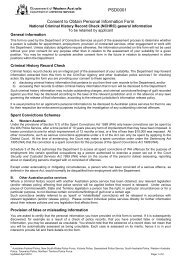
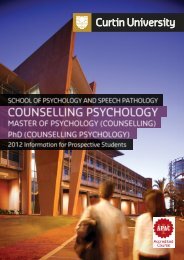
![Mental health commission report July 2010 - June 2011 [.pdf]](https://img.yumpu.com/50755705/1/184x260/mental-health-commission-report-july-2010-june-2011-pdf.jpg?quality=85)
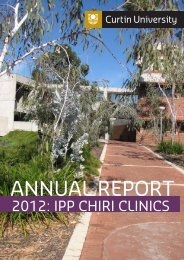
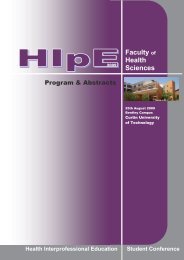
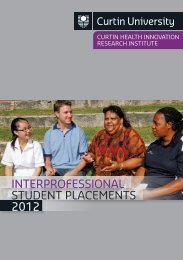
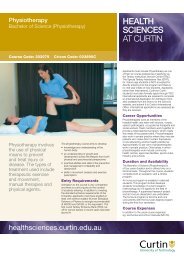
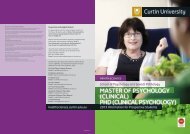
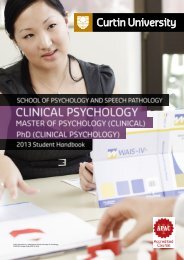


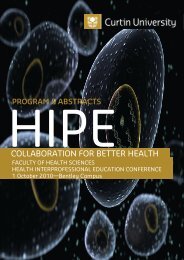
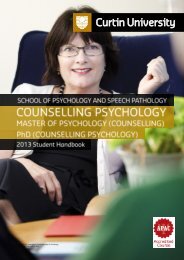
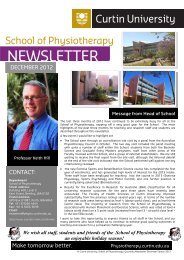
![2007 Annual Report [.pdf] - Health Sciences - Curtin University](https://img.yumpu.com/44476724/1/184x260/2007-annual-report-pdf-health-sciences-curtin-university.jpg?quality=85)